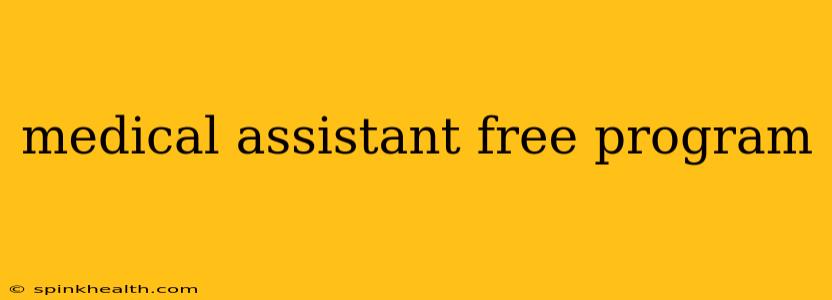The world of healthcare is calling, and for many, the path to becoming a Medical Assistant (MA) seems like the perfect answer. But the cost of education can be a daunting obstacle. Fortunately, several avenues offer aspiring MAs the chance to pursue their dreams without breaking the bank. This story explores the landscape of free medical assistant programs, revealing the possibilities and the realities involved.
Imagine this: You're passionate about helping people, eager to contribute to a vital healthcare system, but worried about student loans. The thought of hefty tuition fees might feel paralyzing, making you question whether your healthcare career aspirations are even achievable. But what if I told you there's a way to start your journey without the financial burden? Let's delve into the options available for free or low-cost medical assistant training.
Are There Truly Free Medical Assistant Programs?
The answer, while nuanced, is a cautious "yes." Completely free, comprehensive programs are rare. However, several avenues provide significantly reduced costs or even free tuition under specific circumstances. These include:
1. Grants and Scholarships:
Many organizations offer grants and scholarships specifically for aspiring healthcare professionals. These awards can cover tuition, fees, books, and even living expenses. Diligent research is key. Check out:
- The Health Resources and Services Administration (HRSA): HRSA offers various grant programs supporting healthcare workforce development, including scholarships for students in underserved communities.
- The American Association of Medical Assistants (AAMA): The AAMA frequently lists scholarships and grants on their website, tailored to individuals pursuing medical assisting careers.
- Local and State Organizations: Your state’s healthcare association or local community colleges may offer financial aid specifically for medical assistant programs. Don't underestimate the power of local resources!
2. Vocational Schools and Community Colleges with Financial Aid:
While not entirely "free," community colleges and vocational schools often provide affordable options coupled with generous financial aid packages. Pell Grants, federal student loans, and institutional aid can significantly lower the overall cost. Exploring these options often yields a far more affordable path than for-profit institutions.
3. Employer-Sponsored Training:
Some healthcare facilities offer on-the-job training programs for medical assistants. While these programs might not grant a formal certification, they offer valuable hands-on experience and can pave the way for future advancement. This route often involves a commitment to work for the sponsoring employer for a specified period after completing the training.
4. Military Programs:
For those serving or veterans of the military, various programs may offer tuition assistance or waivers for medical assistant training. The specifics depend on your branch of service and eligibility criteria.
What About Online Free Medical Assistant Programs?
While numerous online courses offer aspects of medical assisting training, comprehensive, accredited programs that are entirely free are uncommon. Beware of programs that seem too good to be true; ensuring accreditation is crucial for career recognition and employability. Online resources can supplement your learning, but a fully accredited program, even with financial aid, usually remains necessary.
What are the Typical Requirements for Medical Assistant Programs?
High School Diploma or GED:
Most medical assistant programs require a high school diploma or its equivalent (GED). This forms the foundation for your further education.
Background Check and Drug Screening:
Due to the sensitive nature of working in healthcare, expect a thorough background check and drug screening as part of the admissions process.
Healthcare Experience (Sometimes):
While not always mandatory, some programs prefer applicants with prior experience in healthcare settings, even if it's volunteer work. This demonstrates your commitment and aptitude for the field.
How Long Does it Take to Become a Medical Assistant?
The length of a medical assistant program varies, typically ranging from a few months to two years, depending on the program's intensity and whether it’s a certificate or associate degree program.
Can I Become a Certified Medical Assistant with a Free Program?
The availability of certification depends on the program's accreditation. Many community college and vocational school programs lead to certification upon successful completion. However, you may have to pay separately for the certification exam itself.
Finding the right path to becoming a medical assistant can be a journey. Remember to research thoroughly, explore available funding options, and network within your community. Your healthcare career aspirations are within reach!

